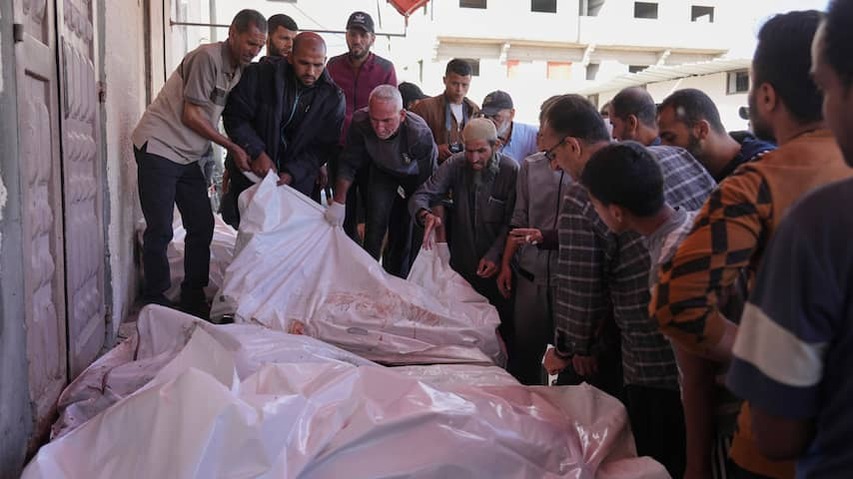
The call for measures against Israel because of the violence in Gaza is growing louder. In addition, there is the question of whether the Israeli army is committing genocide. But if the world waits until that is legally established, we will be too late, experts say.
Despite the pressure on the international community to speak out against Israel, this has not led to actions from Western countries that would cause Israel to back down. The Israeli army has actually further intensified its attacks on Gaza in recent weeks.
Again, hundreds of Palestinians have died as a result of the violence: the total death toll is now estimated to be above 55,000. Moreover, there is a threat of even greater famine than already exists, the international food watchdog IPC reported last month.
The International Court of Justice is investigating possible genocide in Gaza and compliance with the genocide convention. That investigation is still ongoing and genocide has not yet been legally established. But that is not necessarily necessary to hold the Israeli government accountable for its actions, Professor of International Crimes Alette Smeulers tells NU.nl.
The International Court of Justice stated during an interim judgment in 2024 that the risk of genocide in Gaza is high. The Court emphasized that Israel must do everything to prevent genocide. According to Smeulers, this was also an important signal to governments of other countries to do everything to prevent genocide in Gaza.
‘Not the moment to waste another three years’
“To intervene, you don’t have to wait for a conviction from the International Court of Justice,” says Smeulers. Countries that have signed the genocide convention have the obligation to prevent genocide.
Historian Iva Vukusic also emphasizes that it is not necessary to wait for a ruling from the Supreme Court before other countries intervene; on the contrary. “I think it is absolutely necessary at this time for countries to put pressure on Israel,” says Vukusic.
“According to the information from Gaza, too many people are dying, suffering and starving. It is simply not the moment to waste at least another three years waiting for a legal outcome.” That is how long the court’s ruling can take.
More and More Scientists Speak of Genocide
Many academic lawyers, historians and sociologists at home and abroad have also concluded that genocide is indeed taking place. Smeulers is one of them. “In the meantime, the Israeli army has killed a lot of people, destroyed the entire infrastructure in Gaza, making life virtually impossible. Israeli ministers also openly say that they want to get rid of all Palestinians. That is ethnic cleansing.”
Criminologist Yarin Eski also thinks that there is genocide. Eski compiled and co-authored a scientific book on victimhood in genocides. In order to legally prove genocide, intent plays a major role. It is precisely this intention that is most difficult to prove in genocide.
In that regard, Eski recognizes comparisons between the Israeli violence and the genocide in Rwanda. For example, Hutu extremists said during the genocide in Rwanda about Tutsis: the cockroaches must be exterminated. “This dehumanized victims into a thing. You hear that kind of narrative now also from the Israeli government and in the army. And then there are also the images of Palestinian mothers, children and fathers who have been shot to pieces or hit by rocket impacts.”
Other scientists are more reluctant to use the word genocide. For example, Vukusic does not think it is up to her to determine genocide. “I think it could certainly be genocide, but it is ultimately up to the Court to decide that.”
Vukusic does find it plausible that there is genocide. “For now, there is enough evidence that the Israeli army has committed war crimes, and probably also crimes against humanity. Something must be done to stop the suffering. And I don’t think the endless debate about whether it is genocide necessarily promotes help.”
Evolving insight
Some organizations and scientists quickly labeled Israel’s invasion after the terrorist attack by Hamas on October 7, 2023 as genocide. But a large group of experts thought that was too early then. Smeulers too.
“I think you could ask yourself at that point whether it was justified. I also think it backfired in the debate in the beginning. But now Israel is going so far that the term genocide is very justified,” she says.
Smeulers has been thinking that “for quite some time,” she adds. She finds it difficult to say in retrospect what the exact tipping point was. “Let me put it this way: only at the very beginning could you still wonder what the objective was. Was that ethnic cleansing, or an exaggerated response to an equally reprehensible horrific attack?”
That doubt is now gone. She believes genocide is an important term to indicate the urgency. “It simply covers the intensity of the suffering now.”